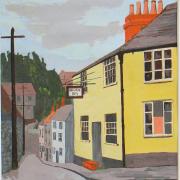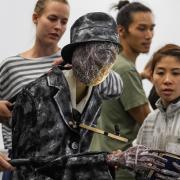His extraordinary physique made Chang Woo Gow famous, but this well educated family man sought escape from the limelight in Boscombe
As we celebrate the arrival of the Chinese Year of the Dog spare a thought for Bournemouth’s most celebrated oriental resident, Chang Woo Gow who delighted and astonished polite society in the late 19th century.
Standing nearly eight feet tall in his stockinged feet, Chang the Chinese Giant (as he was widely known) used to hold court at his home Moyuen, a Victorian villa in Southcote Road, Boscombe.
As he took his evening stroll a gaggle of followers would watch as the towering Chinaman made his way along the street. Sometimes he’d indulge them and light a cigar from one of the gas-lamps.
But all he really wanted was a quiet life. Suffering from ill health he had retired to the seaside town with his wife and two sons making a modest living by running tea-rooms and an Oriental Bazaar selling Chinese curios, bronzes and silks.
A softly spoken, well-educated one-time businessman who had once been destined to become an international tea-importer, Chang was a prisoner of his extraordinary physique.
He had been born into a well-to-do family in Southern China in the 1840s. Yet before arriving in Bournemouth in late 1880s he had spent nearly 30 years as a fairground, circus and theatrical novelty act, a freak-show exhibit.
At the height of his fame Chang had been toured across the USA by American showman Phineas Barnum as part of his celebrated Greatest Show on Earth.
He also spent many years in Australia and toured Europe, making his debut in London in 1865 at the Egyptian Hall in Piccadilly where he appeared together with a stage wife called Kin Foo and a Chinese dwarf named Chung Mow.
It was a tawdry life. Even though Barnum paid him the handsome sum of $500-a-month to dress up in Mandarin robes or the war-mongering finery of a Mongolian warrior, Chang almost certainly wished that it didn’t have to be that way.
He was fluent in six languages, gentle, intelligent, well-mannered and quiet by nature with no natural affinity for the brash showmanship of the circus world.
We don’t know for certain why Chang ended up in Bournemouth, but we do know that he was suffering from advancing tuberculosis and desperately needed to retire from the rigours of life on the road. With its fresh sea-air and pine-scented chines, Bournemouth was celebrated as a health spa in the 19th century and would have been an obvious choice.
Chang had married a Liverpudlian woman called Catherine Santley while in Australia, and they arrived on the Hampshire/Dorset coast with their two young sons, Edwin and Ernest, sometime in the 1880s.
It is believed they spent time on the Isle of Wight before settling on Moyuen, the stylish new villa near Bournemouth Railway Station where they would make their home and business.
Sadly Chang’s days were numbered. His illness progressed and he would survive only until 1893, outliving his wife by four months and supposedly dying of a broken heart.
Even though he had only been in the town for a few short years Chang was a hugely popular character. It was decided to keep his funeral a secret to prevent hundreds of mourners turning out to watch as his eight foot six inch coffin was lowered into his grave at Bournemouth’s Wimborne Road cemetery.
The plot, where he is buried alongside his wife, is unmarked. This may be because the original headstone degraded or, as has been suggested, because Chang himself, tired of a lifetime of being gawped at, requested an unmarked grave.
Chang’s sons, aged 13 and 15, were taken in by their father’s good friend and near neighbour William James Day - a renowned professional photographer famous for his images of Bournemouth and its environs.
Day, who had been at Chang’s deathbed, was quoted as saying that he had “passed away among strangers in a foreign land, one of the noblest and gentlest of men.”
My fascination with Chang
Many mysteries surround the story of Chang. One woman who would like to discover more is Julie Bright who has lived in his old house, Moyuen, for 30 years. Chang’s old home is now Bournemouth’s Ashleigh Hotel which is run by Julie and her husband Ray with maybe a little help from Chang himself along the way.
When I visited, the heating mysteriously burst into life halfway through our interview. No automatic thermostat setting, no human interference. Julie laughed. “Chang!” she exclaimed. “He does that. He switches the heating on if he thinks it’s getting a bit cold.”
A confirmed sceptic who says she doesn’t believe in ghosts, Julie is nonetheless comfortable with what she regards as the friendly spirit presence of Chang Woo Gow.
She has spent decades collecting facts, figures, old cuttings, photographs and pieces of memorabilia marking the brief but memorable tenancy of the Ashleigh’s esteemed former resident. She has even commissioned a commemorative blue plaque for the hotel’s front wall.
Looking at a photograph of Chang, she told me: “He was a fascinating man who led an extraordinary life. I’d love to know more about him. I’d also love to see a photograph of him actually here in this building. That’s one thing I’ve never been able to find.”
There are many stories surrounding his time at Southcote Road. Chang was said to have built ten foot walls around the property to stop prying eyes. There are also claims that he had a special five foot high table built, and that he had the door lintels cut away, almost to ceiling height, so that he could pass through without the risk of banging his head.
Occasionally visitors are drawn to the Ashleigh by Chang’s story. Julie tells of a young Spaniard who came specifically to seek out the grave of the ‘Chinese Giant’.
While an American metal detectorist who discovered a 19th century souvenir medallion marking Chang’s time with Barnum’s Greatest Show on Earth flew over specially to present it to Ray and Julie.
“It was amazing. He found the medal at Coney Island, looked up Chang on the internet and decided that we should have it. He’d never been out of the States before but got himself a passport and turned up on our doorstep!”
More…
• Clive Farrell, Colonel John Blashford-Snell and Wolfgang Grulke and their support for Tomorrow’s Museum for Dorset - A world-renowned explorer, a palaeontologist and futurist, and a butterfly conservator reveal the importance of the past for the future of mankind



























